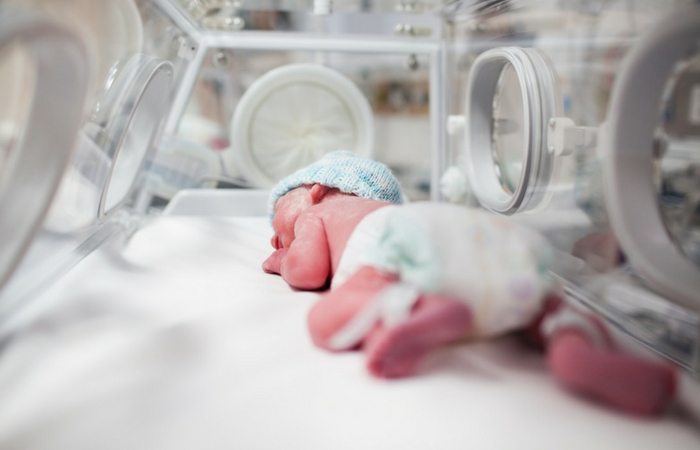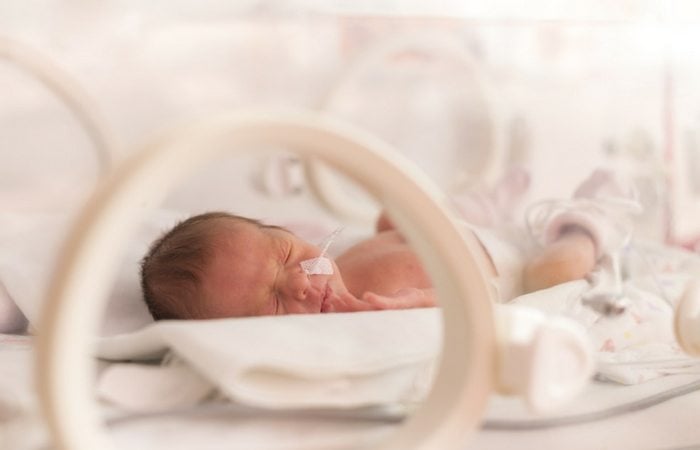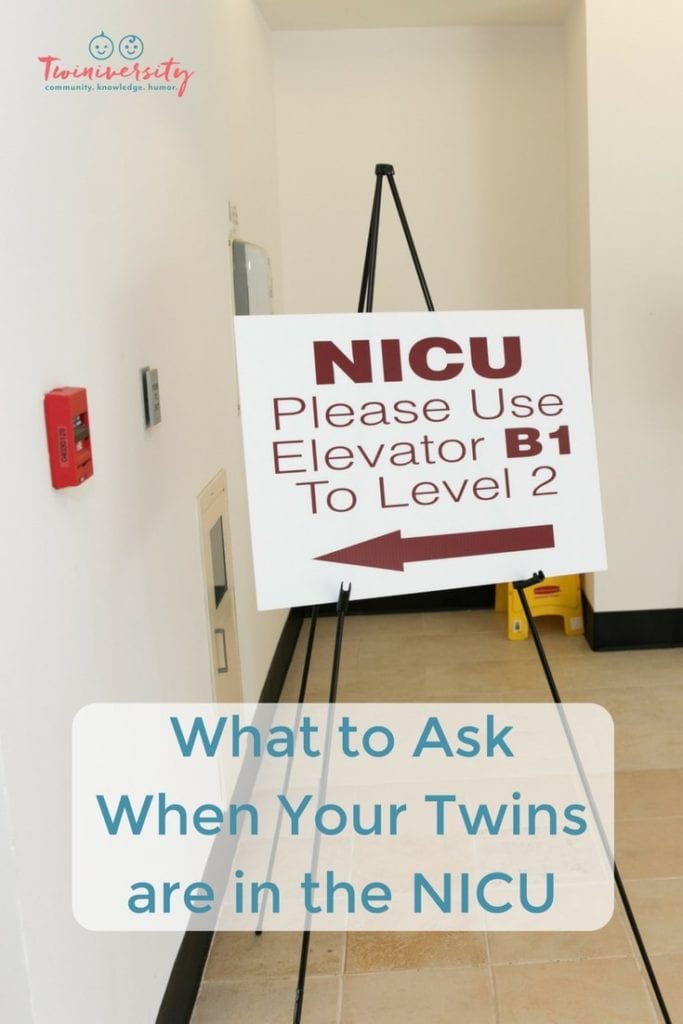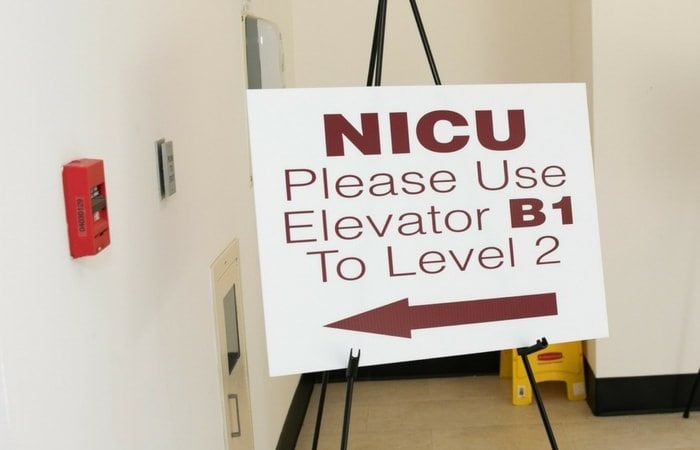Last updated on April 26th, 2024 at 08:15 pm
Having your twins in the NICU brings so many questions to parents: Will my twins be okay? How long will we be here? Will they come home at the same time? Does this mean future health problems?
Fret not. My twins were born at only 28 weeks and came home separately, spending 49 and 60 days in the NICU. Now, 15 months later, you can’t even tell they were preemies.
I asked my husband to refresh my memory and remind me of any questions we asked while our girls were in the NICU, and he didn’t even miss a beat – “Coffee. Because sometimes you have to ask the nurse station for K-cups.”
His hilarious sense of humor aside, here are some things we made sure to ask hospital staff, nurses, and doctors while our 28-weeker warrior princesses were in the NICU.
Kangaroo Care
I had no idea what that meant at first, and it wasn’t until the girls had been in the NICU for 5 days that I learned what it meant – skin to skin contact with your baby. Moms and dads can both do it, as long as the baby can handle it. It’s usually done by placing the baby in diapers directly on the exposed chest of the parent, chest-to-chest, and covering the baby with a cozy blanket.
Gently humming, caressing through the blanket (your baby’s skin may be very sensitive depending on how early she/he arrived), and breathing calmly is a great way to bond with your little bundles of joy.
Twiniversity Tip: Kangaroo Care may help your babies keep warm, keep heartbeats and breathing regular, gain weight, spend more time in deep sleep, spend more time being quiet when awake and less time crying, have a better chance of being able to breastfeed
Medications and Alarms
During your status as a NICU parent, you will hear many different and repeating beeps and alarms. Some can be very startling (fellow Bradycardia-prone baby moms, raise your hands), while others are subtle and even pleasant (Medela bottle warmers).

Do not be afraid to ask why an alarm is going off, what it means, and what needs to be done in order to fix it. Little oxygen monitors that go on tiny feet can sometimes get tangled or have had contact with the foot, and a false desat alarm can happen. Same goes for the respiratory rate and heart rate monitors. Some babies may need caffeine IVs, and those also beep.
Even the tiniest babies are on medication through IVs and, once they get big and strong enough to bottle feed, some can receive medication orally. It is always a great idea to ask your babies’ nurses and doctors what medications they take if any, and why. The more you know about your baby and how she/he is doing, the better prepared you will be for their homecoming and post-NICU care.
Want to learn more about NICU nurses, what they do, and how they are a critical part of your twins’ care team?
Tests
NICU doctors, often called neonatologists are often insanely busy and so are the nurses, so you might not hear about certain tests done on your babies. The diaper change time is the perfect time to ask the nurse if there have been any tests done on your babies and, if so, why. A lot of tests are done proactively, so do not assume something is seriously wrong with your babies – you would absolutely know if that were the case.
Social Workers and Psychologists
Hospital parking, hospital cafeteria, and gas can amount to a huge lump of money in times like these. Ask your nurse if there’s a Social Worker who you can speak to, and apply for food vouchers and parking passes. At our hospital, we were quickly enrolled in a program like that and they even had a psychologist who I talked to once a week, making postpartum depression and the “preemie mom syndrome” easier to deal with.
Same Room or Same Incubator
When my girls were born, they were placed in rooms across from each other. That meant I had to divide my time in between two rooms, make sure I was taking turns pumping in each room, and being wheeled back and forth to see them. I eventually asked why they weren’t in the same room, and it turned out to be due to room availability at the time.

Their next room, however, was huge and their incubators were placed side-by-side. My girls were never placed in the same incubator – they touched in the womb but didn’t touch again until they were a little over a month old and in my arms at the same time. They held hands and drew closer to each other. But why not in the same incubator? I did ask, and I was told it was to minimize anything one baby might catch to the other. That made sense to me.
Visits and Phone Calls
It’s an excellent idea to get acquainted with the NICU’s visitor schedule. At our NICU, we could only have two visitors per day who couldn’t be there for the doctors’ rounds and had to leave by 9 pm. Since our girls were born in mid-December, flu and RSV season kicked in shortly after and nobody under the age of 14 could visit, which made our situation hard when one baby came home before the other.
Nurses will often be more than happy to report on your little ones for you if you can’t make it to the NICU one day, or if they had an especially hard day and you wanted an update later on. Ask for the direct number, extensions, write down your babies’ doctor’s name and make sure to set up a password for sensitive information.
Breastfeeding & Pumping
When your little ones are ready to learn to eat, you may ask your nurse about breastfeeding if that’s something you’d like to try. Some nurses are also lactation consultants and can help you get started with the breastfeeding process – providing nipple shields, different positions, and answering any and all questions you may have regarding breastfeeding and/or pumping breast milk.
Another thing you can ask the nurses is if you can be there for their first bottle. It may happen when you’re not there, and that’s normal. Don’t see it as a milestone you missed – you’ll witness it again and many more milestones in your twins’ lives!
Ronald McDonald House
The Ronald McDonald House is a lifesaver to many families who live far away from the NICU. The House usually contains hotel-like rooms and allows NICU parents (as well as PICU parents) to stay there, provides them with food and laundry services, and helps relieve the tension of potentially expensive hotel stays.
Some hospitals, much like ours, have a Ronald McDonald House café and a partial Ronald McDonald House in the actual hospital as well as a remote one. Make sure you ask your nurses and Social Workers for more information on the Ronald McDonald House. It’s truly a lifesaving tool for any pediatric patient’s parents.

NICU stays are never easy, regardless of how short or long, the stay is. These questions, as well as many more questions that will come up, become part of your routine for the duration of this phase. Always ask about things you don’t understand, procedures that sound confusing, breastfeeding concerns, and anything that comes to mind. And do remember that the NICU stay is only a small phase in your children’s lives. This too shall pass, and you’ll eventually come to remember it lovingly.
Oh, and do make sure you ask where you can get some coffee, as my husband kindly reminded me to add.

Camila Servello is a mother of identical twin girls, human to a pup, wife to an amazing man, Brazil native, airline employee who loves her job. I’ve always loved writing, and I’ve found the perfect reason to do so – my crazy, perfectly flawed life. Honesty is key when it comes to handling all the curveballs life throws at us, so don’t expect any less from me.








